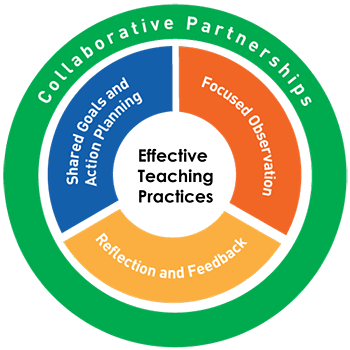Uses the Practice-Based Coaching (PBC) model
The ECPL Coaching Project, provided through The Center: Early Childhood Professional Learning, partners with Early Childhood Care and Education staff, families, and community stakeholders to support sustainable reflective practice that drives continuous quality improvement, which allows for high quality outcomes for educators, children, and their families.
Since 2011, Early Childhood Professional Learning (ECPL) has been funded by the Illinois State Board of Education (ISBE) to provide embedded professional learning for educators in state funded preschool programs through the Coaching Project. Programs participating in the project are either recommended by ISBE based on their quality improvement plans or request a coach through an application process. The ECPL Coaches have extensive experience in early childhood education and participate in ongoing reflective supervision and professional learning offered through ECPL, partner organizations, and conferences.
The ECPL Coaching Project operationalizes its mission using the Practice-Based Coaching (PBC) model. The foundation is a framework of effective teaching practices that result in high quality outcomes for children. The cyclical process of quality improvement occurs within the context of collaborative partnerships between coaches and teachers.
Practice Based Coaching

Shared Goals and Action Planning
The teacher completes a needs assessment based on the defined effective teaching practices. The coach reflects on the results of the needs assessment with the teacher and facilitates the teacher’s choice of a focus area for improvement. Together the teacher and coach create a SMART goal and action plan.
Focused Observations
The term “observation” refers to the process of gathering and recording information about implementation of the effective practice identified in the goal. Focused observations are guided by the goal and action plan steps. For the purpose of “observation”, the teacher submits evidence of actions taken toward accomplishing the chosen goal.
Reflection and Feedback
Based on the observation, reflective conversation takes place between the coach and teacher to decide whether or not the goal has been accomplished, is in process, or if the action plan needs to be revised.
For the 2019-2020 school year, the PFA Coaching Project began using an online professional learning platform where coaches and teachers meet virtually to work on the PBC cycle. The online platform was customized by ECPL to contain tools and resources that support PBC – including a needs assessment, information about goal setting and action planning, and guidance for reflective conversations within collaborative partnerships. Mechanisms for data collection are also built into the platform for evaluation purposes.
ECPL is committed to ensuring the services offered through the PFA Coaching Project support sustainable reflective practice that drives continuous quality improvement and results in high quality outcomes for early childhood educators, children, and their families.
Feedback from Programs:
From Teacher:
"The greatest impact has been her ability to push my thinking and creativity to better my practice."
From Administrator:
"This is the most useful Professional Development tool I have used in my 15 years working in Pre-K."
